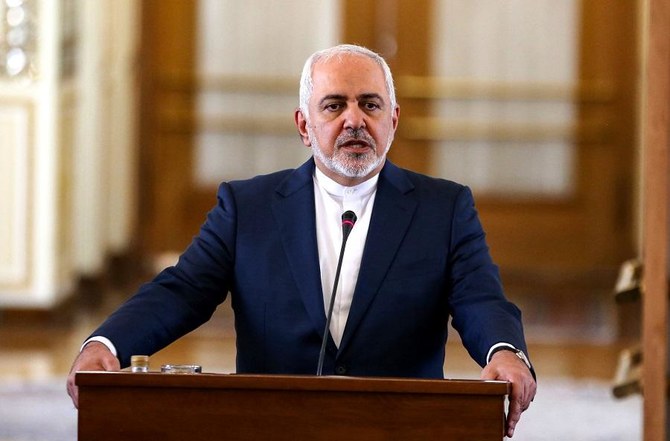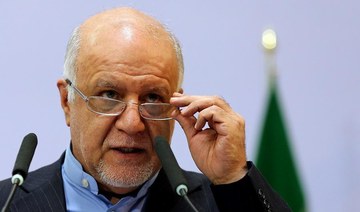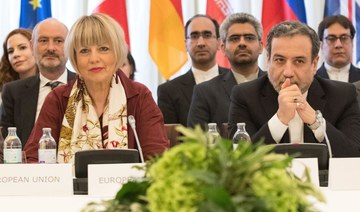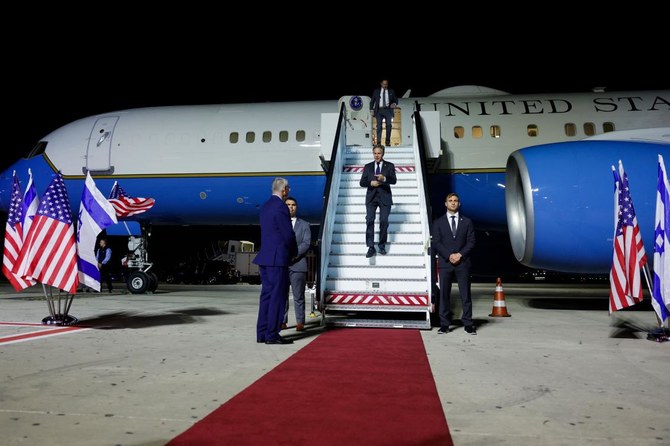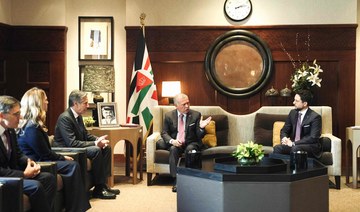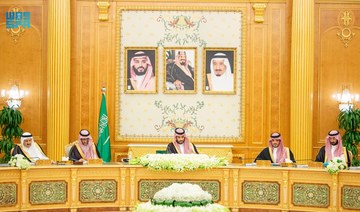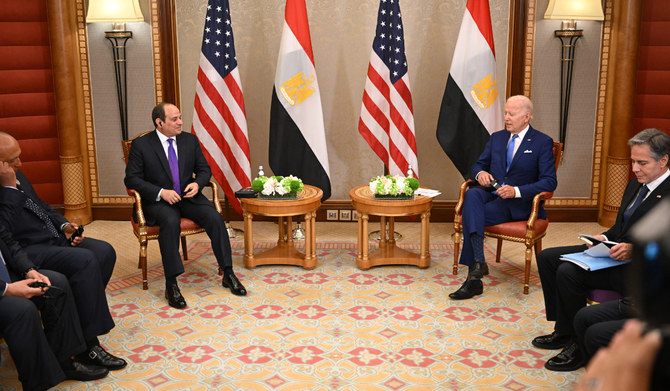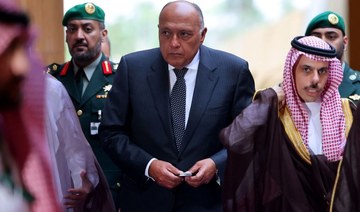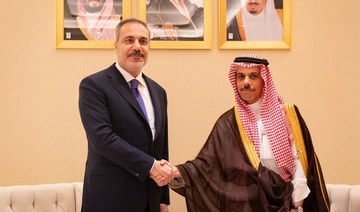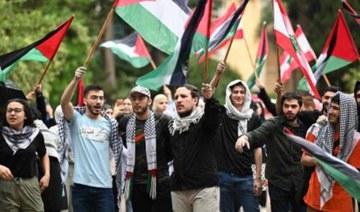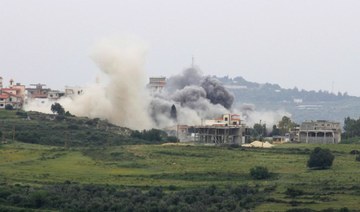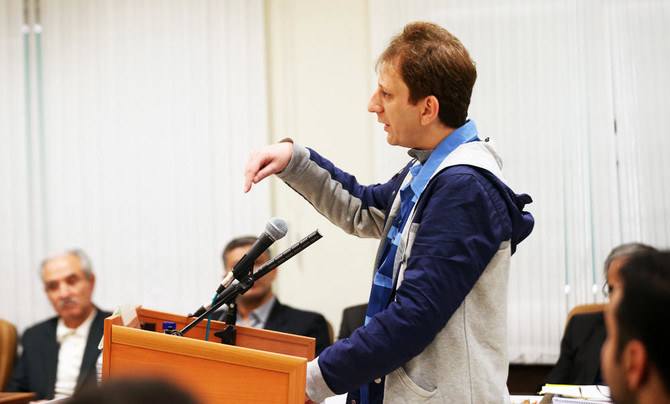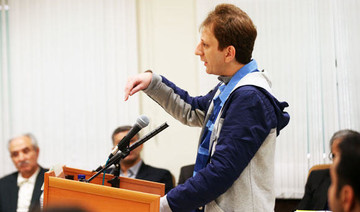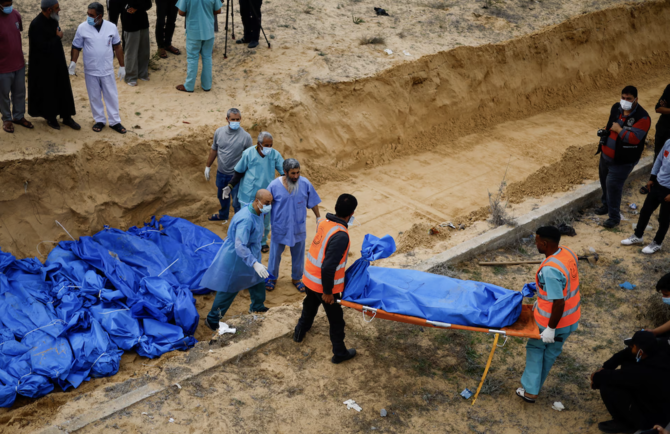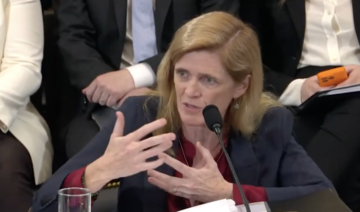DUBAI/VIENNA: Iran faces crippling new worldwide sanctions after it admitted stockpiling enriched uranium above limits imposed by the 2015 agreement to curb its nuclear program.
Iran's Foreign Minister Mohammad Javad Zarif said on Monday his country's nuclear program had passed the threshold, as it had warned it would, drawing a warning from US President Donald Trump that Tehran was “playing with fire.”
Trump, asked if he had a message for Iran, said: “No message to Iran. They know what they’re doing. They know what they’re playing with, and I think they’re playing with fire. So, no message to Iran whatsoever.”
The UN nuclear watchdog, the International Atomic Energy Agency (IAEA), which monitors Iran's nuclear program under the deal, confirmed in Vienna that Tehran had breached the limit.
"We can confirm that IAEA Director General Yukiya Amano has informed the Board of Governors that the Agency verified on 1 July that Iran's total enriched uranium stockpile exceeded (the deal's limit)," an IAEA spokesman said.
An IAEA report sent to member states put Iran's stock at 205 kg, above the deal's limit of 202.8 kg.
Under the nuclear deal, the Joint Comprehensive Plan of Action (JCPOA), there is a dispute resolution process that could end at the UN Security Council in 65 days with a snapback of UN sanctions on Iran. The country’s economy is already collapsing under sanctions imposed by US President Donald Trump after he withdrew from the JCPOA.
Enriching uranium to a low level of 3.6 percent fissile material is the first step in a process that could eventually allow Iran to amass enough highly-enriched uranium to build a nuclear warhead.
Zarif said the move was not a violation of the accord, arguing that Iran was exercising its right to respond to the US walkout.
“We have NOT violated the #JCPOA,” Zarif wrote on Twitter, referring to the deal by the acronym for its formal title, the Joint Comprehensive Plan of Action.
He referred to a paragraph of the accord which contains the mechanism for countries to resolve disputes over compliance.
“As soon as E3 abide by their obligations, we’ll reverse,” he said, referring to European powers Britain, Germany and France. Iran has demanded they guarantee it the access to world trade envisioned under the deal.
Zarif said Iran’s next move would be to enrich uranium beyond 3.67 percent, a threshold Tehran has previously said it would cross on July 7. That would be a much bigger breach than Monday’s announcement that it holds too much material at a permissible purity.
Strong diplomatic response
Russia on Tuesday urged Iran not to give in to emotion and abide by nuclear agreements.
“We call on our Iranian colleagues to show sang-froid, not to give in to emotions by any means and observe key provisions” of international nuclear agreements, Russian Foreign Minister Sergei Lavrov said.
French President Emmanuel Macron called on Iran Tuesday to “immediately” reduce its enriched uranium reserves, a day after Tehran’s move.
In a statement, Macron said he had “noted with concern” Iran’s overstepping of the limit set in the 2015 deal with world powers and called on Iran “to immediately reverse this overshoot and abstain from any other measure that would undermine its nuclear obligations.”
Earlier, UN Secretary General Antonio Guterres told Tehran breaching the deal was not in its interests. “Such action … would not help preserve the plan, nor secure the tangible economic benefits for the Iranian people,” his spokesman Stephane Dujarric said.
Tehran’s latest move is a nightmare for European countries after French, British and German officials promised a strong diplomatic response if Iran breached the deal.
Prime Minister Theresa May’s office said Britain was urgently considering its next moves along with its partners, and urged Iran to “reverse this step.” Her foreign secretary, Jeremy Hunt, said he was “deeply worried.”
Israeli Prime Minister Benjamin Netanyahu said the European countries should “stand behind their commitments” and impose “automatic sanctions” on Iran.
"I say again that Israel will not allow Iran to develop nuclear weapons," Netanyahu said, according to a statement from his office.
"On this day I also call on all European countries to stand behind their commitments. You committed to act the moment Iran violates the nuclear agreement, you committed to activate the mechanism for automatic sanctions that was set in the (U.N.) Security Council," he said.
Earlier on Monday Israel's energy minister accused Iran of pursuing "nuclear blackmail" by stockpiling more low-enriched uranium than permitted under the deal but said continued international pressure would cause Tehran to back down.
"It's a blatant violation of the agreement," Yuval Steinitz said on Kan public radio. "Iran is carrying out nuclear blackmail. It is saying to the world, 'Look how close we are to a nuclear weapon'.
"Iran's economy is collapsing ...they are under atomic pressure, so they are taking unbalanced actions," he added. "If the pressure continues, and the world doesn't give in, they will give it up.”
Brinskmanship
Breaching the nuclear deal “marks a new chapter in an extremely protracted, and dangerous, game of brinksmanship between Iran and the other signatories to the JCPOA,” the Iranian-American Harvard scholar Dr. Majid Rafizadeh told Arab News.
“This demands a strong response from Europe. By surrendering to Iran’s extortion attempts, Europe will fail to curb Tehran’s regional and global ambitions and will be, in effect, giving Tehran the green light to continue its march towards becoming a destructive nuclear force.
“There may still be some in Europe who cannot see beyond what they consider to be the value in the JCPOA, but it is time to recognize that the agreement is not ‘comprehensive’ at all. It is a compromise, and bowing to nuclear extortion is a compromise too far.
“Europe must now focus its diplomatic efforts on countering the clear and present threat that aggressive Iranian behavior across the region poses. It is time for Europe to move its efforts away from keeping the failing deal alive. It is time for Europe to switch off life support for the JCPOA.”
"Deeply worried"
Meanwhile, UK Foreign Minister Jeremy Hunt also said on Monday that Britain was “deeply worried” by Iran’s announcement that it has exceeded the limit on enriched uranium stockpiles set by a 2015 nuclear deal.
“Deeply worried by Iran’s announcement that it has broken existing nuclear deal obligations,” Hunt, a candidate to become Britain’s next prime minister, said on Twitter.
“UK remains committed to making deal work (and) using all diplomatic tools to deescalate regional tensions. I urge Iran to avoid any further steps away from JCPOA (nuclear deal and) come back into compliance,” he added.
After talks on Friday in Vienna, Iran said European countries had offered too little in the way of trade assistance to persuade it to back off from its plan to breach the limit, a riposte to U.S. President Donald Trump's decision last year to quit the deal and reimpose economic sanctions.
Mousavi urged them on Monday to step up their efforts. "Time is running out for them to save the deal," state TV quoted him Mousavi as saying.
The deal between Iran and six world powers lifted most international sanctions against Iran in return for restrictions on its nuclear work aimed at extending the time Iran would need to produce a nuclear bomb, if it chose to, from roughly 2-3 months to a year.
Zarif’s confirmation of the breach came just hours after he warned that Iran would never succumb to US pressure, adding that if Washington wanted talks with Tehran it should show respect.
“Iran will never yield to pressure from the United States ... America should try to respect Iran ... if they want to talk to Iran, they should show respect,” Zarif said in a speech broadcast live on state TV.
Tension between Tehran and Washington have risen sharply in recent weeks, a year after Washington exited the 2015 deal between Iran and world powers to curb Tehran’s nuclear program in exchange for the lifting of international financial sanctions.
Trump has called for talks with Iran’s clerical rulers with “no preconditions.” Tehran has ruled this out, saying Trump should return to the deal if he wants to negotiate with Iran.
* With Reuters, AP and AFP




